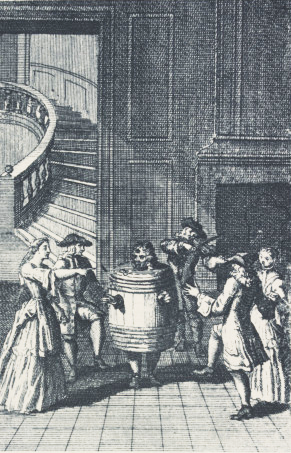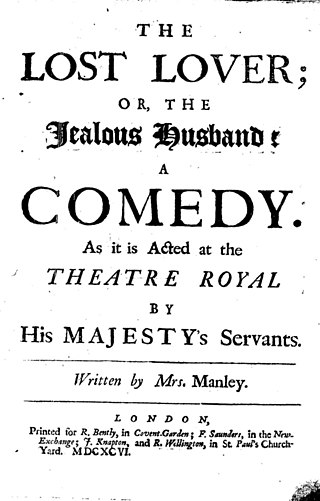Related Research Articles

Aphra Behn was an English playwright, poet, prose writer and translator from the Restoration era. As one of the first English women to earn her living by her writing, she broke cultural barriers and served as a literary role model for later generations of women authors. Rising from obscurity, she came to the notice of Charles II, who employed her as a spy in Antwerp. Upon her return to London and a probable brief stay in debtors' prison, she began writing for the stage. She belonged to a coterie of poets and famous libertines such as John Wilmot, Lord Rochester. Behn wrote under the pastoral pseudonym Astrea. During the turbulent political times of the Exclusion Crisis, she wrote an epilogue and prologue that brought her into legal trouble; she thereafter devoted most of her writing to prose genres and translations. A staunch supporter of the Stuart line, Behn declined an invitation from Bishop Burnet to write a welcoming poem to the new king William III. She died shortly after.

"Restoration comedy" is English comedy written and performed in the Restoration period of 1660–1710. Comedy of manners is used as a synonym for this. After public stage performances were banned for 18 years by the Puritan regime, reopening of the theatres in 1660 marked a renaissance of English drama. Sexually explicit language was encouraged by King Charles II (1660–1685) personally and by the rakish style of his court. Historian George Norman Clark argues:
The best-known fact about the Restoration drama is that it is immoral. The dramatists did not criticize the accepted morality about gambling, drink, love, and pleasure generally, or try, like the dramatists of our own time, to work out their own view of character and conduct. What they did was, according to their respective inclinations, to mock at all restraints. Some were gross, others delicately improper.... The dramatists did not merely say anything they liked: they also intended to glory in it and to shock those who did not like it.
This article contains information about the literary events and publications of 1696.
Susanna Verbruggen, aka Susanna Mountfort, was an English actress working in London.

The City-Heiress, or, Sir Timothy Treat-all is a play by Aphra Behn first performed in 1682. The play, a Restoration comedy, reflects Behn's own highly Royalist political point of view.

The Fair Jilt: or, the Amours of Prince Tarquin and Miranda is a short novella by Aphra Behn published in 1688.
The Forc'd Marriage; or, The Jealous Bridegroom is a play by Aphra Behn, staged by the Duke's Company on 20 September 1670 in Lincoln's Inn Fields, London, England. This sex tragicomedy ran for six nights, which granted Behn the house profits for both the third and six nights. It is considered her first staged play. Thomas Otway played a "probation part."

The Lost Lover; or The Jealous Husband: A Comedy, Delarivier Manley's first published play, was performed in March 1696 at Theatre Royal, Drury Lane. The performance ran only three nights.

Sir Patient Fancy: A Comedy, is a comedic play written by Aphra Behn, first performed in 1678. It is Behn's first overtly political play. It was staged by the Duke's Company at the Dorset Garden Theatre in London with a cast that included Nell Gwyn as Lady Knowell, Anthony Leigh as Sir Patient Fancy, John Crosby as Leander Fancy, Thomas Betterton as Wittmore, William Smith as Lodwick Knowell, James Nokes as Sir Credulous Easy, John Richards as Curry, Elizabeth Currer as Lady Fancy, Mary Betterton as Isabella, Emily Price as Lucretia and Anne Shadwell as Maundy.
John Bowman (1651–1739) was a British stage actor. He began his career in the Duke's Company at the Dorset Garden Theatre. In 1692 he married Elizabeth Watson, who acted under the name Elizabeth Bowman. He later switched to act at the Drury Lane Theatre. He is also referred to as John Boman.
Mary Powell was an English stage actor of the seventeenth century and early eighteenth century.
Joseph Williams was an English stage actor of the seventeenth and early eighteenth century.
The Innocent Mistress is a comedy written by Mary Pix, first performed in 1697.
George Bright was an English stage actor of the seventeenth and early eighteenth century. He specialised in playing "comic dullards, fops and bouncy servants". After beginning his career in Dublin he joined the Duke's Company at the Dorset Garden Theatre in 1679 and then became part of the merged United Company in 1682.

The Counterfeit Bridegroom; Or, The Defeated Widow is a 1677 comedy play. The work's authorship is usually credited to Aphra Behn has been alternatively been attributed to Thomas Betterton. It was inspired by Thomas Middleton's Jacobean play No Wit, No Help Like a Woman's.
Thomas Percival or Percivall was an English stage actor of the seventeenth century. He was a member of the Duke's Company from 1671 to 1682 and then the merged United Company until 1686. Throughout his career he was confined to playing supporting roles, never graduating to major parts. He was the father of the actress Susanna Verbruggen. In 1693, following his retirement from the stage, he was arrested for coin clipping, a capital crime, for which he was sentenced to hang at Tyburn. The intercession of his daughter with Mary II saw his sentence commuted to transportation, but before he reached Portsmouth he died of natural causes.
Elizabeth Bowman was an English stage actor of the seventeenth and early eighteenth century. The daughter of Sir Francis Watson, 1st Baronet she was adopted by the actor manager Thomas Betterton. In 1692 she married John Bowman and began acting at Drury Lane the following year as Mrs Bowman. She was a member of the United Company until 1695 then joined Betterton's breakaway at the Lincoln's Inn Fields Theatre.
Love For Money; Or, The Boarding School is a 1691 comedy play by the English writer Thomas D'Urfey. It was originally staged at the Theatre Royal, Drury Lane by the United Company. In 1733 it was adapted into a ballad opera The Boarding School by Charles Coffey.

Agnes de Castro is a 1695 tragedy by the English writer Catharine Trotter. Based on the novel of the same title by Aphra Behn, it was first staged by John Rich's company at the Theatre Royal, Drury Lane.
Charlotte Butler was an English stage actress and singer of the seventeenth century. She may have joined the Duke's Company in the 1670s, but her first definite recorded performance was in Aphra Behn's The Revenge (1680) The anonymous A Satyr on The Players describes her,
References
- ↑ Jamoussi, Zouheir. (2011). Primogeniture and Entail in England : a Survey of Their History and Representation in Literature. Cambridge Scholars Pub. p. 173. ISBN 9781443830607. OCLC 827209305.
- ↑ Janet Todd and Derek Hughes (ed), Mary Ann O'Donnell (2004). "Aphra Behn: The Documentary Record". The Cambridge Companion to Aphra Behn. Cambridge: Cambridge University Press. p. 2.
{{cite book}}:|last=has generic name (help) - ↑ Van Lennep p.459
- ↑ Katherine M. Quincey (ed), Peggy Thompson (1996). "Closure and Subversion in Behn's Comedies". Broken boundaries : women & feminism in Restoration drama . Univ. Press of Kentucky. pp. 84. ISBN 0813119456. OCLC 715868441.
{{cite book}}:|last=has generic name (help)
